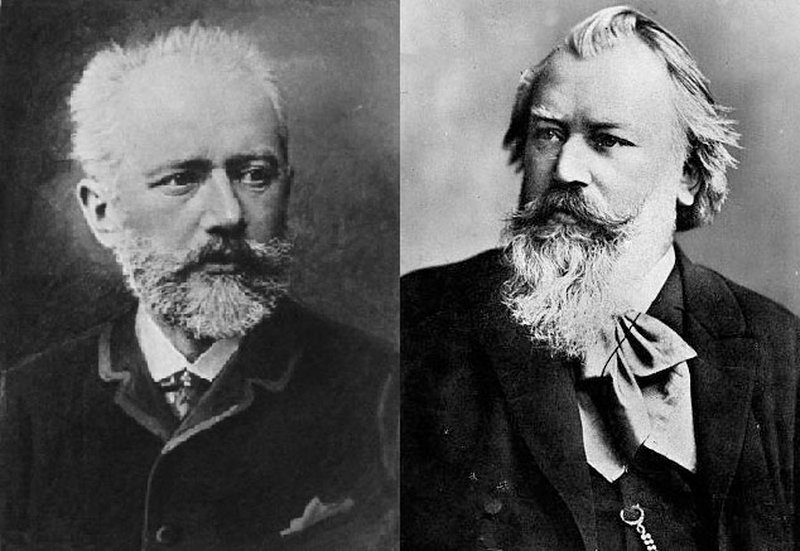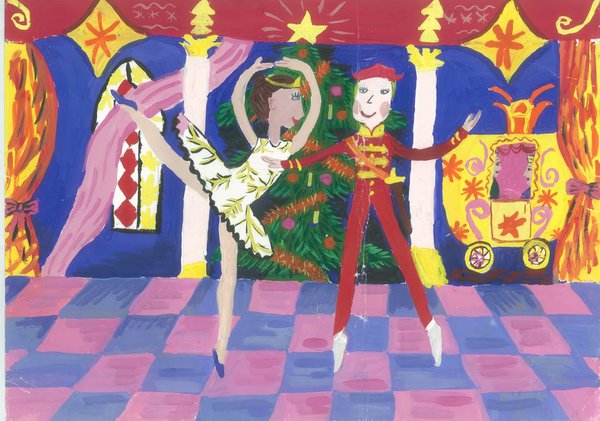When Tchaikovsky met Brahms in Germany, the Russian was 48 years old and the German 55. By that point, Tchaikovsky had composed his Piano Concerto No. 1, Violin Concerto, Fourth Symphony, Piano Trio in A minor, ballet Swan Lake and opera Eugene Onegin, but had yet to write The Nutcracker and Sleeping Beauty ballets or his opera The Queen of Spades. Brahms was already renowned by 1888 for what would be the lion’s share of his oeuvre, including his Symphonies Nos. 1-4, Piano Concertos Nos. 1 and 2, Violin Concerto, A German Requiem and a vast quantity of chamber and vocal music – though some late masterpieces were still to come. The two composers first met in Leipzig through Russian-born violinist Adolph Brodsky (who had premiered Tchaikovsky’s Violin Concerto and taught at the Moscow Conservatory, 1875-79). In his tour diary, Tchaikovsky describes the event, going on to detail his inability to take the music of Brahms to heart – showing the courage of his convictions on that account while also voicing an obvious respect.
Tchaikovsky writes: “Going to Brodsky’s for the one o’clock dinner, I heard sounds of the piano, violin and cello. They were rehearsing for the next day’s performance of Brahms’ new Pianoforte Trio [op. 100], and the composer himself was at the piano. Thus it chanced that I saw the famous German musician for the first time. Brahms is a rather short man, suggests a sort of amplitude, and possesses a very sympathetic appearance. His fine head, almost that of an old man, recalls the type of a handsome, benign elderly Russian priest… A certain softness of outlines, pleasing curves, rather long and slightly grizzled hair, kind gray eyes, and thick beard freely sprinkled with white – all this recalled at once the type of pure-bred Great Russian, so frequently met with among our clergy… Brahms’ manner is very simple, free from vanity, his humor jovial, and the few hours spent in his society left me with a very agreeable recollection.
“Unfortunately, I was forced to confess that, in spite of a somewhat prolonged stay among them in Leipzig, I had not gotten on very well with the most prominent members of modern German music,” Tchaikovsky continues. “The reason: Like all my Russian musical friends, without exception, I only respected Brahms as an honorable, energetic musician of strong convictions; but, in spite of all efforts to the contrary, I never could, and never can, admire his music… There is something dry, cold, vague and nebulous in the music of this master that is repellent to Russian hearts. From our Russian point of view, Brahms does not possess melodic invention. His musical ideas never speak to the point; hardly have we heard an allusion to some tangible melodic phrase than it disappears… as though the composer’s special aim was to be incomprehensible and obscure. Thus he excites and irritates our musical perceptions, as it were, yet is unwilling to satisfy their demands; he seems ashamed, to put it plainly, to speak clearly and reach the heart…
“It is impossible in listening to Brahms’ music to say that it is weak or unremarkable,” Tchaikovsky goes on. “His style is always elevated. Unlike all our contemporary musicians, he never has recourse to purely external effects; he never attempts to astonish us, to strike us by some new and brilliant orchestral combination; nor do we meet in his music with anything trivial or directly imitative. It is all very serious, very distinguished, apparently even original, but in spite of all this, the chief thing is lacking – beauty! A few years ago, when I frankly expressed my opinion of Brahms to [pianist-conductor] Hans von Bülow, he replied: ‘Wait a minute, the time will come when you will enter into the depth and beauty of Brahms. Like you, it was long before I understood him, but gradually, I was blessed by the revelation of his genius. It will be the same with you.’ And still I wait; but the revelation tarries. I deeply revere the artistic personality of Brahms. I bow to the actual purity of his musical tendencies, and I admire his firm, proud renunciation of all the tricks that solemnize the Wagner cult, and in a much less degree the worship of Liszt, but I do not care for his music.
“My readers will see that this fact prevented my seeking an intimate acquaintance with the very attractive personality of Brahms,” Tchaikovsky concludes. “I met him in the society of devoted partisans (of whom Brodsky is one), and it appeared to me unseemly – seeing as I was a stranger and did not share I the worship of their idol – to bring any discordant element into the complete harmony of these intensely devout believers... Brahms himself – as though he distinctly understood, or was actually aware of, the fact that I did not belong to his camp – made no effort to become intimate. He was quiet simple and polite to me as to everyone else, but nothing more. Meanwhile, all that I have heard of Brahms as a man has made me doubly regret that the ‘revelation’ predicted by Von Bülow has not been vouchsafed me. He is an unusually pleasing and attractive man, and all who have come into contact with him are inspired by a warm affection and devotion. The celebrated Czech composer Dvorák spoke with tears in his eyes of the warm interest that Brahms showed him at a time when his compositions found neither publishers nor performers – what powerful support he gave him and what energy he showed in sounding the depths of unknown genius in his Slavonic brother in art! Brodsky also related instances that revealed the sympathetic side of Brahms’ character, especially his rare and pleasing modesty…”
Tchaikovsky and Brahms would meet again two years later in Brahms’ native town of Hamburg, where the Russian was conducting his Symphony No. 5. Supposedly, Brahms traveled there especially to hear the work. After the concert, the German composer invited Tchaikovsky to dinner, during which they enjoyed each other’s company – even though Brahms admitted that he didn’t care for the symphony, and Tchaikovsky revealed that he had never warmed to Brahms’ music. Agreeing to disagree, as it were, they apparently parted as friends, but would never meet again.








 Все новости
Все новости




